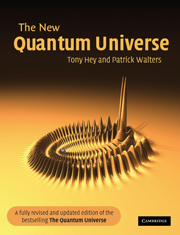Book contents
- Frontmatter
- Contents
- Preface
- Prologue
- Route map
- 1 Waves versus particles
- 2 Heisenberg and uncertainty
- 3 Schrödinger and matter waves
- 4 Atoms and nuclei
- 5 Quantum tunnelling
- 6 Pauli and the elements
- 7 Quantum co-operation and superfluids
- 8 Quantum jumps
- 9 Quantum engineering
- 10 Death of a star
- 11 Feynman rules
- 12 Weak photons and strong glue
- 13 Afterword – quantum physics and science fiction
- Epilogue
- Appendix 1 The size of things
- Appendix 2 Solving the Schrödinger equation
- Glossary
- Quotations and sources
- Suggestions for further reading
- Photo-credits
- Name index
- Subject index
Epilogue
Published online by Cambridge University Press: 05 October 2013
- Frontmatter
- Contents
- Preface
- Prologue
- Route map
- 1 Waves versus particles
- 2 Heisenberg and uncertainty
- 3 Schrödinger and matter waves
- 4 Atoms and nuclei
- 5 Quantum tunnelling
- 6 Pauli and the elements
- 7 Quantum co-operation and superfluids
- 8 Quantum jumps
- 9 Quantum engineering
- 10 Death of a star
- 11 Feynman rules
- 12 Weak photons and strong glue
- 13 Afterword – quantum physics and science fiction
- Epilogue
- Appendix 1 The size of things
- Appendix 2 Solving the Schrödinger equation
- Glossary
- Quotations and sources
- Suggestions for further reading
- Photo-credits
- Name index
- Subject index
Summary
A poet once said ‘The whole universe is in a glass of wine’. We will probably never know in what sense he meant that, for poets do not write to be understood. But it is true that if we look at a glass closely enough we see the entire universe. There are the things of physics: the twisting liquid which evaporates depending on the wind and weather, the reflections in the glass, and our imagination adds the atoms. The glass is a distillation of the Earth's rocks, and in its composition we see the secret of the universe's age, and the evolution of the stars. What strange array of chemicals are there in the wine? How did they come to be? There are the ferments, the enzymes, the substrates, and the products. There in wine is found the great generalization: all life is fermentation. Nobody can discover the chemistry of wine without discovering, as did Louis Pasteur, the cause of much disease. How vivid is the claret, pressing its existence into the consciousness that watches it! If our small minds, for some convenience, divide this glass of wine, this universe, into parts – physics, biology, geology, astronomy, psychology, and so on – remember that Nature does not know it! So let us put it all back together, not forgetting ultimately what it is for. Let it give us one more final pleasure: drink it and forget it all!
- Type
- Chapter
- Information
- The New Quantum Universe , pp. 313 - 314Publisher: Cambridge University PressPrint publication year: 2003

